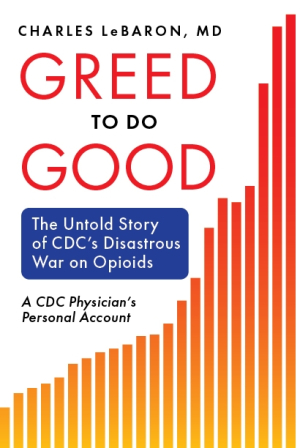Greed to Do Good
The Untold Story of CDC's Disastrous War on Opioids: A CDC Physician's Personal Account
An extended criticism of how a government agency mishandled the opioid crisis, Greed to Do Good is an edifying insider’s look at the US’s ongoing struggles with drug abuse.
CDC epidemiologist Charles LeBaron’s political science text Greed to Do Good exposes bureaucracy gone wrong alongside an account of the opioid crisis.
Challenging the Centers for Disease Control and Prevention’s influential 2016 recommendations to reduce opioid prescriptions, this book argues that the resulting guidelines did little to curb opioid usage. Instead, it says, the guidelines drove users to illegal options, resulting in an alarming rise in overdose deaths. The book also asserts that the CDC was too in thrall of its past successes to recognize either the real costs of its aggressive methodologies or the practical needs of those fighting opioid addiction across the nation. Personal anecdotes from LeBaron’s clinical work, where he had no way to taper his patients off of their dependency, complement these arguments, as does his commentary about what it’s like to rely on opioids for relief from active pain (he was prescribed the drugs for bacterial meningitis).
While the book’s claims are supported by ample statistics, its firsthand commentary is often more compelling. LeBaron details how the system works and gives insights into why a doctor might end up prescribing more oxycodone than they are comfortable with. Sympathy is extended to those in active pain who have to wait for the relief of the next dose or wean off of the drugs once they’ve served their purpose.
However, the text is sometimes vague, as with its multiple byzantine clues as to the location of a referenced CDC trip, the site of which is never confirmed in direct terms. A pharmaceutical company family’s greed is also alluded to without specific enough information to help those outside of CDC circles understand the family’s role in the crisis. In addition, humanizing context is missing when the book covers some of those who overdosed; pictures of those lost appear sans sufficient explanation, interspersed with the afterword. Further, the book is relatively brief given the ground it covers, and it comes to a too-abrupt conclusion. Its source list is ample, adding to its credibility on the whole while also consuming a fair portion of its total page space.
An informative political science exposé, Greed to Do Good reflects deep understandings of the opioid crisis, bearing witness to the complex realities of those in the throes of addiction.
Reviewed by
Carolyn Wilson-Scott
Disclosure: This article is not an endorsement, but a review. The publisher of this book provided free copies of the book and paid a small fee to have their book reviewed by a professional reviewer. Foreword Reviews and Clarion Reviews make no guarantee that the publisher will receive a positive review. Foreword Magazine, Inc. is disclosing this in accordance with the Federal Trade Commission’s 16 CFR, Part 255.

